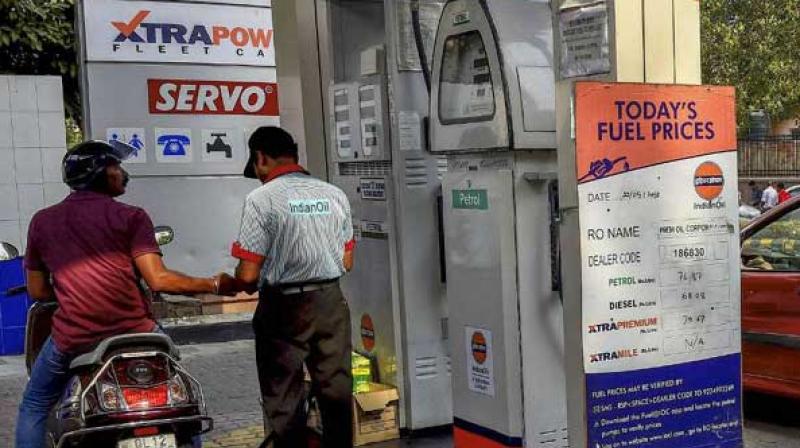Govt may not burden OMCs further with fuel subsidy
The market capitalisation of six large oil companies has falled by Rs 1.2 lakh crore.

New Delhi: Allaying concerns about the return of fuel subsidy regime, a top finance ministry official on Thursday said the government asking oil PSUs to subsidise petrol and diesel prices by Re 1 per litre was a one-time thing and it does not intend to ask them to do it again. While oil marketing companies will continue to enjoy marketing freedom, upstream oil producers like ONGC would not be asked to share fuel subsidy burden, he said.
Just last week, the government had cut excise duty on petrol and diesel by Rs 1.50 per litre and asked state-owned oil marketing companies (OMCs) to subsidise the two fuels by another Re 1 a litre. But most of the Rs 2.50 per litre reduction in rates effected from October 5 has been lost in increases in selling prices on subsequent days, giving rise to the suspicion that the government may again ask OMCs to subsidise fuel. “The rupee 1 absorption by OMCs in their pricing was a one-time thing,” the official said.
The government, he said, has no intention of asking them to do that again. Following the comments, shares of OMCs surged by as much as 19 per cent intra-day, defying the broader market trends. Shares of HPCL surged 19 per cent to hit a high of Rs 215.40, BPCL jumped 7 per cent to Rs 284.80 and IOC gained nearly 8 per cent to Rs 134 in intra-day trade. The benchmark BSE Sensex fell 759.74 points to close at 34,001.
The cut in excise duty and OMCs absorbing some prices had led to a drop in the price of petrol from a record high of Rs 84 per litre to Rs 81.50 in Delhi and that of diesel from an all-time high of Rs 75.45 to Rs 72.95 a litre on October 5. But rate hikes on subsequent days have pushed prices up.
Petrol has risen by 86 paise per litre since then and diesel by Rs 1.67, negating the entire excise duty reduction in less than a week. Petrol price in Delhi on Thursday stood at Rs 82.36 per cent while diesel was priced at Rs 74.62.
The official said the government is also not looking at bringing back the subsidy sharing mechanism where upstream firms like ONGC subsidised cooking fuels LPG and kerosene by giving discounts on crude oil they sold to refiners. Oil and Natural Gas Corporation (ONGC) shares surged to Rs 159.60 during intra-day trade on the BSE before ending at Rs 152.90, up 2.86 per cent. Oil producers ONGC and Oil India had till June 2015 made good as much as 40 per cent of the under-recoveries or subsidy arising out of selling fuel at below market price.
According to Moody’s Investors Service, share prices of state-owned oil companies have declined around 20 per cent on average since the government on October 4 announced a reduction in the country’s fuel prices.
The aggregate market capitalisation of the six largest listed government owned/linked oil companies had fallen by Rs 1.2 lakh crore since then, it said. “The share price decline is credit negative for the oil companies because of the high level of cross-shareholdings in one another. The market values of their respective investments have declined, reducing their financial flexibility,” it said.
Shares of HPCL closed up 14.70 per cent at Rs 207.15. BPCL was up 5.11 per cent at Rs 278.65 and IOC ended 5.39 per cent higher at Rs 131 on the BSE.
Meanwhile, Jet fuel or ATF prices were on Thursday cut by 2.6 per cent following the government decision to lower excise duty on the fuel. Aviation turbine fuel (ATF) is now cheaper than petrol and diesel.
ATF in Delhi was cut by Rs 1,962 per kilolitre (kl), or 2.6 per cent, to Rs 72,605 per kl (Rs 72.6 per litre), according to a notification issued by state-owned oil firms. It costs Rs 72,225 per kl in Mumbai, down from Rs 74,177.
Even at the reduced price, ATF is at its highest level since March 2014.
The government had on Wednesday cut excise duty on jet fuel to 11 per cent from 14 per cent previously to give relief to the aviation industry that has been in recent weeks hit hard by rising fuel prices and plummeting rupee. The move came after jet fuel prices this month hit their highest level since January 2014. Rates had risen by 9.5 per cent since July, and over 58.6 per cent since July last year. While the ATF has been cheaper than petrol before, the fuel used in aeroplanes is cheaper than even diesel now.
Petrol in Delhi costs Rs 82.36 per cent and diesel is priced at Rs 74.62.
Just last week, the government had cut excise duty on petrol and diesel by Rs 1.50 per litre and asked state-owned oil firms to subsidise the fuel by another Re 1 a litre. That step was matched by BJP-ruled states cutting local sales tax or VAT by an equal proportion to give customers hit by high auto fuel prices a relief of about Rs 5 per litre.

